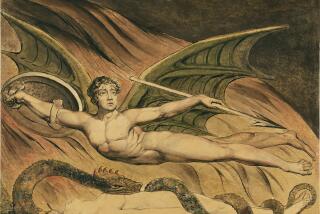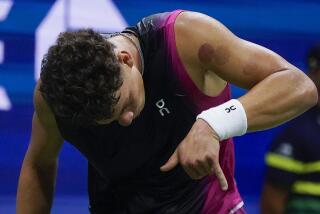Hewitt’s at Fault on This Issue
- Share via
NEW YORK — Picketers protested against the United States Tennis Assn.’s wild-card selection system, claiming it was discriminatory against African Americans, on the first day of the 2001 U.S. Open, not much more than a lob away from Arthur Ashe Stadium.
Martina Hingis hit the first ball of the Open in Arthur Ashe Stadium, then apologized for saying in a Time magazine article published this week that sisters Venus and Serena Williams used race to their advantage.
So even before James Blake stepped on the court at Louis Armstrong Stadium against Lleyton Hewitt of Australia on Friday, it was sadly clear that the mentality of the sport remains white although its two most recognizable stars are not.
Many players have no idea about the great heritage of their work place for these two weeks, the legacy of Ashe and Armstrong.
At best, there is a stunning naivete in this most insular world. Hingis shrugged and smiled and explained her unforced errors by saying she is unfamiliar with the language.
Hewitt does not have that excuse.
He has been an equal-opportunity offender in 2001. The 20-year-old from Adelaide called umpire Andreas Elgi a spastic at the French Open and apologized after a serious round of criticism at home by advocacy groups for the disabled.
On Friday, Hewitt escaped almost certain defeat when Blake, a wild-card entrant, got sick and cramped in the fourth set of their five-set marathon. Hewitt won, 6-4, 3-6, 2-6, 6-3, 6-0, but afterward found it more problematic to escape from his own words.
In the third set, Hewitt, upset about being called for foot faults on one side, went up to the umpire--coincidentally, Elgi again--to complain about a linesman after his serve was broken early in the set.
“I’ve only been foot-faulted on one side,” Hewitt told Elgi.
Hewitt pointed at the line judge, who is African American, and said: “Look at him.” Then Hewitt pointed toward Blake, an African-American: “Look at him. You tell me what the similarity is.”
Blake heard the remarks and said he thought about it for a couple of points and was bothered. Shortly after receiving intravenous treatment for his heat-induced problems, he spoke to a handful of American and Australian reporters in the locker room.
“I did hear him,” Blake said. “I’ll give him the benefit of the doubt, that it was in the heat of the moment. You’re just trying to win--you’re not thinking about things, politically correct.
“I’m just going to hope he didn’t mean it in any derogatory way. I don’t know what he was thinking or what was on his mind, exactly, at the time. I can’t speak for him. All I can say is that I hope he didn’t mean it in a racist way.”
Is there any other way to mean it?
“I don’t know. I’m going to try to give him the benefit of the doubt,” Blake said.
U.S. Open referee Brian Earley said that the USTA and ITF will review the videotape.
“I don’t think I said anything racial out there,” Hewitt said. “It was a conversation between me and the umpire. I come from a multicultural country. I’m not racial in any way at all. People can have their own opinions. There was nothing racial said out there at all.”
Others did not agree.
Blake’s parents, Thomas and Betty, called the development unfortunate.
They have faced these issues for many years in their mixed marriage. Tom is African American and Betty is white.
“How else could it be interpreted?” Thomas asked.
Thomas Blake also brought up the point that the integrity of the official had been questioned.
“Gut reaction is, it’s a shame it was said,” Thomas Blake said. “It’s a shame it went out over the air. It’s a shame he feels that way. It was somewhat unfair to the guy on the line. That’s not fair to him or James.”
Television announcer John McEnroe said he saw Hewitt in the locker room and noticed that the Australian was shook up in the aftermath of the controversy.
“This is unforgivable, let’s be honest,” McEnroe said.
James Blake took the high road in his talk with reporters and again several hours later in an official news conference, showing maturity beyond his 21 years.
He said he picked up murmurs from parents in junior events but tried to downplay racial issues.
“I heard things I wasn’t supposed to hear,” said Blake, who learned how to play in the Harlem Junior Tennis League.
“I didn’t encounter too much. Obviously, Arthur Ashe went through what he went through and Mal Washington probably went through it to a much greater degree.
“I’ve been very lucky to not deal with too much racism or too many bad encounters in my life. And I’m very thankful for that. I can’t imagine them going through things day in and day out and doing it with such amazing grace, just having the presence of mind that they did in those times, it’s amazing to me.”
Blake did have one response, though Hewitt may not have heard him on the court.
“I didn’t say anything to him at that time, I may have made a joke, that we’re both Americans,” Blake said of himself and the line judge.
Another troubling aspect of the incident was that Blake should have been talking about his terrific performance, not some Australian with a rapidly growing public relations problem. Louis Armstrong Stadium was packed and thousands of spectators stood throughout the 3-hour 6-minute match.
Even before the Hewitt comments surfaced, he was booed by the crowd, which was bothered by his showy antics when Blake was in a tenuous physical condition.
Blake did not think it was up to him to teach Hewitt a lesson on race relations.
“He’s 19, 20 years old,” Blake said. “If you guys have given him some grief about it ... I think he’ll learn from it. And I hope he does. I definitely hope he learns from it. I’ve noticed his parents travel with him, maybe they’ll sit him down.”
(BEGIN TEXT OF INFOBOX / INFOGRAPHIC)
U.S. Open at a Glance
Highlights from the $15.76-million U.S. Open tennis championships:
Weather--Overcast and humid followed by periods of hazy sun. High temperature of 83.
Attendance--Day session: 31,509. Night session: 23,027. Total: 54,536.
Results--Men, second round: No. 1 Gustavo Kuerten defeated Kristian Pless in straight sets; No. 4 Lleyton Hewitt needed five sets to top James Blake; No. 5 Juan Carlos Ferrero beat Vladimir Voltchkov in straight sets; No. 7 Yevgeny Kafelnikov came from two sets down to defeat George Bastl; No. 11 Alex Corretja stopped Jerome Golmard in straight sets; No. 12 Arnaud Clement defeated Jan Siemerink in four sets; No. 15 Goran Ivanisevic stopped Justin Gimelstob in straight sets; and No. 18 Andy Roddick beat Jack Brasington in four sets. Women, third round: No. 1 Martina Hingis needed a third-set tiebreak to beat Iva Majoli; No. 3 Lindsay Davenport, No. 6 Justine Henin, No. 7 Monica Seles and No. 10 Serena Williams won in straight sets.
Stat of the day--Lleyton Hewitt won the final eight games and nine of the final 10 after wild card James Blake vomited on court at 3-2 in the fourth set.
Quote of the day--”I’ve come a long way. I’m about as proud as I could be. I couldn’t have done anything else out there.”--Blake.
Featured matches--Men: Gustavo Kuerten (1), Brazil, vs. Daniel Vacek, Czech Republic; Patrick Rafter (6), Australia, vs. Christophe Rochus, Belgium; Hugo Armando, U.S., vs. Goran Ivanisevic (15), Croatia. Women: Martina Hingis (1), Switzerland, vs. Lina Krasnoroutskaya, Russia; Lindsay Davenport (3) vs. Emilie Loit, France; Evgenia Koulikovskaya, Russia, vs. Monica Seles (7); Serena Williams (10) vs. Denisa Chladkova, Czech Republic.
More to Read
Go beyond the scoreboard
Get the latest on L.A.'s teams in the daily Sports Report newsletter.
You may occasionally receive promotional content from the Los Angeles Times.











